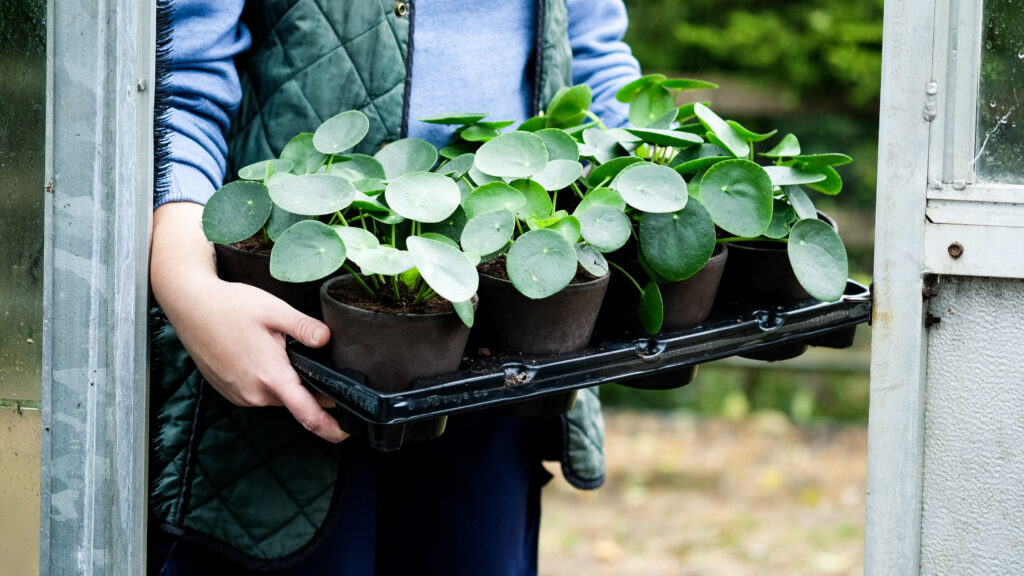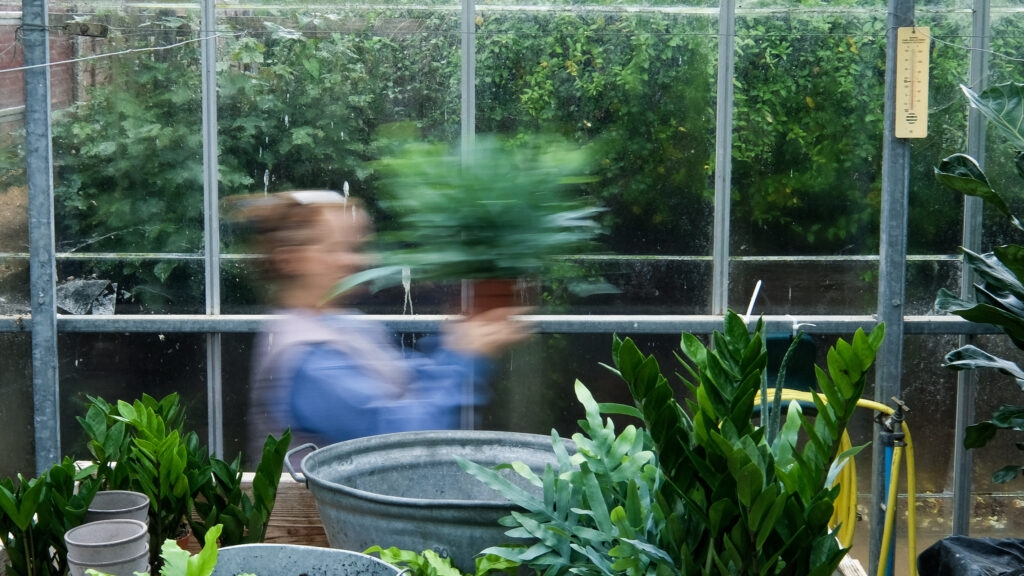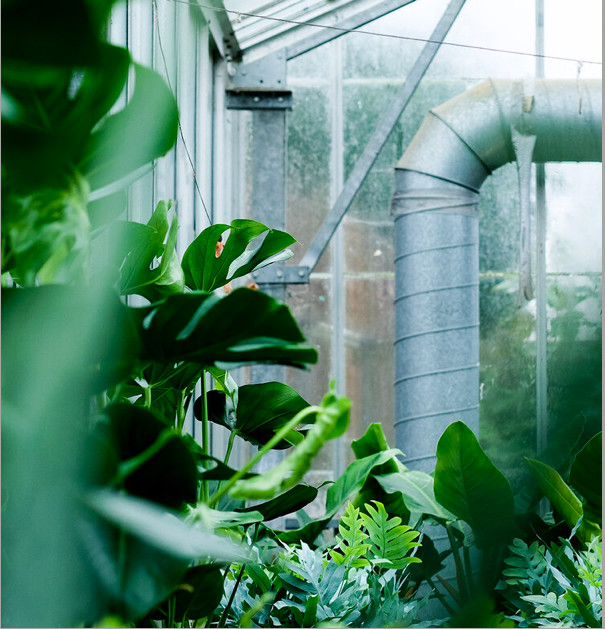Planting change: How a novel scheme helps female ex-offenders put down roots for the future
7/3/2023
Who: Kali Hamerton-Stove and Melissa Murdoch, The Glasshouse
Brand launched: March 2019
Product: Beautiful house plants grown in prison glass houses, as well as plantscaping in office spaces and running corporate workshops.
Impact: Creating opportunities and a brighter future for female ex-offenders at HM Prison East Sutton Park in Kent, where they run a horticultural training programme. Ex-offenders train for a RHS qualification and are supported in finding job placements and housing when they leave prison too, helping end the cycle of reoffending.

SSM: How did you and Melissa come together at the inception to create the glass house? And did the social impact idea come before the product itself?
Kali: Melissa was doing some work in the prison at Sutton Park, helping women who were being released find housing and get settled. She invited me to visit the prison, to see if I could get involved. We’ve done a few things together. She’s very interested in rehabilitation within the prison system and when I was in America, I was very involved with that. My first job was working in rehabilitation.
She had clocked the four large, unused glass houses there. We thought there was a real opportunity to use them to help the women in prison learn a skill and also benefit from the incredible mental and physical wellness aspects of growing. And we wanted to improve people’s opportunities when they went to find work and settle themselves into a life.
So we started doing research and looking into what options we had. I wouldn’t say we’re gardeners or even horticulturalist in many ways, but we both love plants, have lots of houseplants and spend time in the garden and nature. I sold houseplants in my previous work and knew there was a massive trend and opportunity in the indoor plant area. We pulled in a few experts to sit on our advisory board to look at what we could do and had the glass houses reviewed to make sure they were appropriate.
We also found in our research that quite a few prisons in the UK have glass houses. Some are in use but many are not. Also, in many prisons that don’t have a glass house, there’s usually some unused space where we could have one installed. So it seemed like a real opportunity for a social enterprise that could run within the prison system, providing training and experience opportunities that then delivered a product outside of prison.
SSM: It sounds like you both had some great background between the two of you, that made sense for this as a business. But how did you decide which advisors to go after and was it easy to find them?
Kali: We pushed our connections to the limit. We looked at what we needed and a lot of times we didn’t know the exact right person, but we kind of hunted them down. Generally, when we told them what we were doing, people were very supportive.
We met with business advisors. We met with prison specialists like Redemption Roasters, who we tracked down because they had just set up a coffee roastery in prisons and were doing it really well with lots of new outlets in London. They helped us with our presentation.
Then we reached out to Tom Stuart Smith, who is a really well known landscape designer here in the UK, and he offered up one of his specialists for our service as well. So Edward Shackleton was on our advisory board and was really helpful. He took on the horticultural side of it and helped us find someone to look at the glass houses and make recommendations to ensure everything was set up appropriately.
We also had an amazing advisor Melissa came across when she was working within the prison system. Her name is Maria Love and she specialises in rehoming prisoners and making sure they have everything for a healthy, happy reintroduction back into society. She’s been part of our team for 18 months now.
SSM: With your impact, are you at the point where you have case studies of women that have gone through the training and integrated into society?
Kali: We have now had approximately 20 women through the programme and there has been no reoffending. In fact, 100% of women finishing our programme find employment within a month.
Two of the women have continued to work with us after they’ve left prison, managing our maintenance service in London. We’re in the process of starting our training in two additional prisons too – Send and Downview. And we’re looking to open another shop/training facility this year so that women from these prisons can come out to work and earn a living wage.

SSM: How did the pandemic affect the business? In what ways did you pivot the business plan aside from the numbers and the potential growth plan?
Kali: When we originally proposed the business, we were going to do installation and maintenance of house plants for offices, retail and hospitality. We never really planned to do our own retail, or even our own small plant distribution. Our plan was to bring in plants to grow and propagate in the prison, growing them into large plants that would be in offices or malls or wherever.
But when Covid hit, almost immediately after we started doing this, we realised that wasn’t going to be an option. So we reached out to corporates we’d already been talking to about working together and said, listen, obviously no one’s putting plants in offices right now, since they’re closed. Why don’t you send houseplants to your employees in their homes, to show support?
It had amazing pickup and we continue to send plants monthly to clients or employees on behalf of companies, including Ernst and Young, Brompton, Lloyd’s. We originally did this in 2019 and then after Covid hit, we started pushing it. And that kind of kept us going for a while.
Then we realised we’re sending out all these plants to people, they have information about our project and they’re interested in it. There was a lot of feedback and people wanted to be able to buy presents or buy a plant. So in the autumn of 2020, we launched our retail website.
SSM: You ran a limited company – a cafe and a shop – before The Glasshouse. How different do you feel it is running a for-profit business compared to a social enterprise?
Kali: So the thing we always want to happen is for the business to be sustainable, and for it to make enough to support the services we offer. We started The Glasshouse with directors loans and we have had a few very small grants, but that’s it.
I’m constantly interested in the next opportunity to sell a project. I want to keep up that pressure for people to be using us for their plant services and we just want to grow our business so that we can be one of the companies people think about using. Because we want to expand to other prisons, we really need to pick up the number of installations each month.
What I’m saying is, I’m very focused on profit. I still am very focused on the social aspect that we provide. But that’s one of the reasons we have Maria, so there’s help in that area where I actually don’t have that much expertise.
I’ve loved working with the women and learning about what they’ve experienced and what they need. In a way Covid was a gift for this, because we learned so much in a slower way than we would have. It would have been pretty overwhelming to run with it outside of Covid. We had a much longer process to get to know what they want and what they need to get them to a place where they can succeed.
SSM: If you were advising somebody else that had a social enterprise idea, do you think it’s important to have a co-founder team and the right employees in place, so you can focus and drill down on one area? Because it is almost like you need two parts of the brain – you’ve got the impact side, you have the product side.
Kali: I think it’s highly useful to have that. For us, it’s especially true because we’re actually working within the prison systems. There are a lot of intricacies and political parts that someone needs to keep their eye on. I mean, if you want to build a profitable business, don’t do it in a prison. That’s like the hardest thing you can do.
To be fair, I’m impressed with the prison system, certainly at East Park. The horticultural site is amazing. But still, there can be millions of hoops to walk through and the Redemption Roasters told us this from the very beginning.
I think depending on what your social enterprise is, it definitely helps to have someone who’s focused on the numbers and someone who’s focused on social impact. Someone really needs to keep an eye on making sure that social impact is happening.
SSM: You mentioned you had a couple of small grants. Which organisations did you receive funding from and how did you find those?
Kali: We received a grant from the Kent Community Foundation. It was under £10,000, I think, for either setting up the shop or doing work in the glass house. There was another grant from the White Mountain Grant Foundation. We got a partial grant for a delivery van, too.
Another past job of mine a long time ago was grant writing. So I know a few people in that industry, who have given us some advice on where to look and how to apply. We’ve written them ourselves and that’s why there haven’t been very many.

SSM: Do you feel like they’re quite hard to find out about, for other people in this space?
Kali: We have found that community foundations – I think there’s one in most counties and in London – are amazing. They are really accessible and have teams in place that support you in the process. They’ve helped us write them and seen us through the process.
Social Enterprise UK has been great as well. I haven’t applied for a grant there, but they offered us a lot of advice and support. And they’ve been bringing in a few of our clients. I talked to a woman yesterday who came through someone from Social Enterprise UK. I think they’re a really good organisation to look to for grantmaking and support.
SSM: What’s your biggest success or proudest moment in the business’s history?
Kali: After Covid ended and the prison opened up, we knew we needed a space outside of prison. Prisoners who go out on work release have a much lower chance of reoffending. Open prisons are just an amazing idea and there should be so many more opportunities for prisoners. It really helps with that transition.
We found a small property about 15 minutes away from the prison, which is now our shopfront and a packing facility. The women had been wanting to come in for a long time. They kept on saying, you’ve got to get us out to work, we want to have a job outside of prison. It’s been great seeing them interact with the public and do work here, like packing and customer service. They have amazing potential and they’re getting an amazing experience. So that’s been really rewarding for me.
I’m in the shop right now and Alex is here, our most advanced student. She’s going for level three horticulture qualification. I feel proud about that. We want them to have horticultural qualifications, even if they don’t go to work in horticulture. It’s great for them to achieve something and I’ve heard getting to level three is really hard. I don’t know if I could do it.
SSM: Okay, last question! Do you have one piece of advice that you would give to yourself when you were starting out?
Kali: Have a good network of support in place and good systems so you can take care of yourself a little bit, because it can be all-consuming and exhausting working with a social enterprise. You’re not only trying to build a business, which is hard enough, but you’re working with a community that you really believe in and you want to support. It can take over your life. Make sure you take time for yourself and that you have people around you who remind you to do that.
